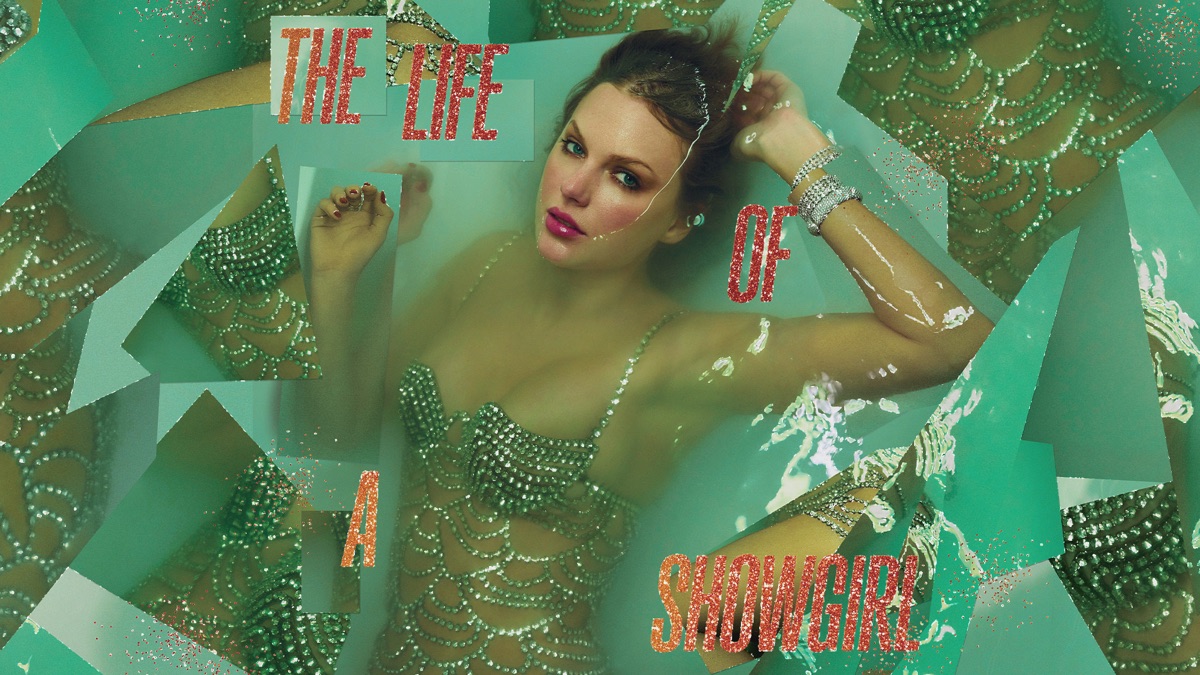
Taylor Swift–a household name in the music industry, a multibillionaire, a 14-time Grammy Award-winning artist, and the performer who holds the title of having the highest-grossing tour of all time–has been the focus of many top pop culture stories in the past few months. From engagements to album announcements, fans have been left wondering “What’s next?”, and after many hours spent listening and researching reviews, I have come to a mixed conclusion on her newly released album, The Life of a Showgirl.
Swift released her twelfth studio album, entitled The Life of a Showgirl, on Oct. 3. The album is described as being pop with soft rock elements, and contains twelve tracks detailing Swift’s recent encounters with fame and love. The center of the album seems to be her budding romance with Kansas City Chiefs tight end, Travis Kelce. The pair announced their engagement via Instagram this past August.
The album begins with the track “The Fate of Ophelia,” which references the Shakespeare play Hamlet, and narrates how someone entered her life at a time when she was alone and “saved” her heart. The song is a mixture of dance-pop and synth-pop, featuring electronic elements and dramatic touches. Overall, it has been well received by critics, with the sound and music video becoming a trending topic on TikTok, and also ending up in my own personal top five.
The second track is titled “Elizabeth Taylor” and makes references to the late Old Hollywood actress with the same name. Swift also mentioned Taylor and her husband, Richard Burton, in her previously released album, reputation. The next track, “Opalite,” is a bright, feel-good, pop-rock song that has quickly become a fan favorite already. The “twinkling” synths and reflective vocals inspire a sense of hope in the listener, helping to portray the message of resilience and achieving your own happiness as the song is meant to.
For me personally, the next two tracks were slightly disappointing. “Father Figure,” the fourth song, contained many lyrics that can only be described as “cringy.” On the first listen, I was not a fan at all, but the more I listened, the more I understood and was able to get behind the intent of the song. It is rumored to be written about Swift obtaining the master rights to her early albums after they were sold without her knowledge to Scooter Braun, a record executive. This track highlights the power dynamics and misogyny Swift has faced while working in the music industry. The fifth song, “Eldest Daughter”, had many good elements to it. On first listen, the slower ballad seemed to fit my musical preferences more than the previous fast-paced pop songs. But, once again, many of the lyrics fell flat. Swift is typically recognized and praised for her intense songwriting and storytelling abilities, and while the song contained some strong lyrics, they did not compare to tracks from her previous albums.
The next track is arguably one of the best on the entire album. In “Ruin The Friendship”, Swift sings a story of longing and regret for a friend she seems to have known in high school. It is filled with nostalgia and reflection on past experiences, ultimately describing the friend passing away. She sets the message to always “ruin the friendship” instead of being caught up in the what-ifs later on. The song “Forever Winter”, previously released on Swift’s album Red (Taylor’s Version), seems to also be about Jeff Lang, a friend of Swift’s who passed away in 2010, which fans quickly pieced together and have dubbed the two tracks “sister songs”.
Track seven, “Actually Romantic,” is rumored to describe an alleged conflict Swift has with fellow singer, Charli XCX. Neither of them has confirmed or denied the rumors, but the song contains fun, teasing, seemingly pointed lyrics at the British pop star. The next two songs, “Wi$h Li$t” and “Wood,” express the singer’s love for her partner and note that he is all she wants.
The tenth song on the album, titled “CANCELLED!”, nods to cancel culture and how many of Swift’s friends, including herself, have been victims of internet harassment and “cancellation”. Her main objective of the song seems to be that these women have been “cancelled” for seemingly no reason. It also relates to the casual misogyny and gender standards society upholds. Track eleven, “Honey,” is another optimistic love song, but contains lyrics about previous times in her life when she did not feel lovable. The verses and choruses contrast each other in an interesting, complementary way.
Lastly, track twelve, “The Life of a Showgirl,” features pop star Sabrina Carpenter and is the title track of the album. As the closing track, it sums up the major themes of the album: fame, love, and perception. It balances the pop, vintage, and performative sounds of the album into a cohesive genre.
Overall, I believe The Life of a Showgirl was a strong pop album. While the lyrics were not as deep and raw as Swift is usually known for, the intense positive emotions that she is able to capture, along with the catchiness of each song, make it worthwhile.